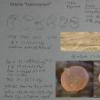
13-01-2026 08:49
 Danny Newman
Danny Newman
Coccomyces sp. on fallen Rhododendron leavesPretty

13-01-2026 08:43
 Danny Newman
Danny Newman
Tricladium varicosporioides on indet. decorticate

12-01-2026 22:02
Ethan CrensonHello all, I am hoping someone will have some ins

13-01-2026 07:57
 Danny Newman
Danny Newman
cf. Bombardia on indet. decorticate woodAppalachia

13-01-2026 07:51
 Danny Newman
Danny Newman
Atrocalyx sp. on indet. herbaceous stemAppalachian

13-01-2026 07:28
 Danny Newman
Danny Newman
Chlorociboria glauca on indet. decorticate logThe

13-01-2026 07:14
 Danny Newman
Danny Newman
Neodasyscypha cerina on indet decorticate logThe S

11-01-2026 20:35
Hello.A very tiny pyrenomycete sprouting sparsely

12-01-2026 05:24
 Danny Newman
Danny Newman
Cyathicula coronata on Urtica dioicaCataloochee Di

15-12-2025 11:49
 Danny Newman
Danny Newman
ITS sequences from the following two collections B
Orbilia sp.
Nicolas VAN VOOREN,
19-05-2009 23:54
 Un Orbilia récolté sur branche morte de Salix, encore en place (h = 1,80 m), me pose problème. Ci-joint la fiche.
Un Orbilia récolté sur branche morte de Salix, encore en place (h = 1,80 m), me pose problème. Ci-joint la fiche.Petite description (in english): asci moderately truncate at apex, 8-spored, 22-34 x 3-5 µm. Paraphyses cylindrical, with a thin and few abundant glassy process, Ø 2,5-3 µm. Spores ovoid, with a rounded SB affixed to the wall by a small connection (difficult to see).
J'ai cherché dans la section Ovoidea mais rien ne semble parfaitement coller. Une idée ? Une direction ?
Hans-Otto Baral,
20-05-2009 13:51

Re:Orbilia sp.
Hi Nicolas
nice find! I presume you have Orbilia cejpi, according to my key. This is a medium rare species, usually found on the ground on various substrates, but sometimes also air-protruding. You should verify that there are no glassy processes at the margin, and also the anamorph would help. Sometimes conidia can be found around the apothecia. They are of the Dicranidion type (tune-fork-shaped) in the case of cejpi and the close O. coccinella. There is also an O. liliputiana which is from Macaronesia on Pinus wood, and this has unbranched conidia.
Do you have macrophotos?
Zotto
nice find! I presume you have Orbilia cejpi, according to my key. This is a medium rare species, usually found on the ground on various substrates, but sometimes also air-protruding. You should verify that there are no glassy processes at the margin, and also the anamorph would help. Sometimes conidia can be found around the apothecia. They are of the Dicranidion type (tune-fork-shaped) in the case of cejpi and the close O. coccinella. There is also an O. liliputiana which is from Macaronesia on Pinus wood, and this has unbranched conidia.
Do you have macrophotos?
Zotto
Nicolas VAN VOOREN,
20-05-2009 14:17

Re:Orbilia sp.
Hi Zotto.
Thank you for your answer. I don't have any macrophoto but I can send the collection to you.
Thank you for your answer. I don't have any macrophoto but I can send the collection to you.
Hans-Otto Baral,
20-05-2009 22:19

Re:Orbilia sp.
Hi Nicholas
I think this would be a good idea. We have not very often seen this O. cejpi. Was it a marshy place, shady or sunny?
Thanks in advance!
Zotto
I think this would be a good idea. We have not very often seen this O. cejpi. Was it a marshy place, shady or sunny?
Thanks in advance!
Zotto
Nicolas VAN VOOREN,
22-05-2009 15:03

Re:Orbilia sp.
Package sent!
Location of the collection: Mervent (Vendée, France), near the "Pont du Diet", along the river "Mère" (0° 46' 26" O, 48° 32' 01" N). This place is "sunny".
Location of the collection: Mervent (Vendée, France), near the "Pont du Diet", along the river "Mère" (0° 46' 26" O, 48° 32' 01" N). This place is "sunny".
Hans-Otto Baral,
26-05-2009 18:52

Re:Orbilia sp.
Hi Nicholas
Now, I have examined 3 of the perhaps 15 or more apothecia, and I always find strongy curved spores! What I see is O. "fabacearum", a not frequent species with spores resembling O. delicatula, but smooth and with the SB in the middle area (dorsal face). It seems we should rename this species, it is the second time on Salix, and it was also once on a conifer.
I will examine more, but I examined also two apos which were only half, so should be those you tested. Did you send me the complete material? We will try a culture because the presumed anamorph is interesting but not sure.
Zotto
Now, I have examined 3 of the perhaps 15 or more apothecia, and I always find strongy curved spores! What I see is O. "fabacearum", a not frequent species with spores resembling O. delicatula, but smooth and with the SB in the middle area (dorsal face). It seems we should rename this species, it is the second time on Salix, and it was also once on a conifer.
I will examine more, but I examined also two apos which were only half, so should be those you tested. Did you send me the complete material? We will try a culture because the presumed anamorph is interesting but not sure.
Zotto
 7796.pdf
7796.pdf